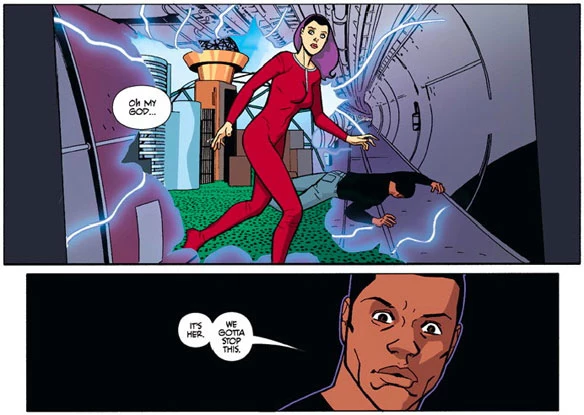![LeVar Burton and Mark Wolfe on Their Debut Comic ‘Con-CERNed’ [Interview]](http://townsquare.media/site/622/files/2010/07/concernedfirstlookmain-1278828963.jpg?w=980&q=75)
LeVar Burton and Mark Wolfe on Their Debut Comic ‘Con-CERNed’ [Interview]
Last week LeVar Burton and co-writer Mark Wolfe of Burton/Wolfe Entertainment took their first step into the comic book industry with "Con-CERNed," an eight-page science fiction story illustrated by David Hahn that introduces Dr. Simon Barstow, a physicist at CERN whose life is forever changed by a fateful encounter with the Large Hadron Collider. Although published as part of the final issues of "MySpace Dark Horse Presents," the series marks a new beginning for the Hollywood veterans, who intend to take their high concept as far as it can go.
We caught up with Burton and Wolfe to discuss their first foray into sequential art, their plans for Simon, and what it means to tell stories in the 21st century.

ComicsAlliance: What was your inspiration to reference a little bit of real-world science in your comic with the Large Hadron Collider?
LeVar Burton: One of the aspects that has defined "Star Trek" as really fine storytelling is that the science in "Star Trek" is always considered to be realistic, but secondary to story. So Mark [Wolfe] suggested, "Let's go that way." Having superheroes is great, but I think some of the most powerful storytelling involves ordinary people doing extraordinary things and so with those two objectives in mind, Mark lead us in the direction of the LHC. It was serendipity, really. It was around the time that the LHC was starting up and they were beginning to smash particles and people were nervous and concerned and excited and [the idea] just worked. It worked as a storytelling device and it put our hero in a precarious situation where he had to respond to extraordinary circumstances.Mark Wolfe: When Dark Horse approached us to do a comic, LeVar was asked, what interests you in this space? And LeVar and I sat down and said, do we want to do this and why? And LeVar said – and this is where the inspiration for this particular story came from – I want to do a superhero story, but one where there are consequences for actions just like in the real world. You know when Superman does anything, it's like he has an endless ability to pull from something. There are no consequences for his [using his powers] like there [could be] in the real world.
As that was going on I read about the CERN [LHC] project and I also read about this whole thing with the [honey] bees disappearing. All of the sudden the bees are disappearing all over the world and they're incredibly important to entire ecosystems. So we put these two kinds of concepts together and said, "What if some of the things that we're doing are affecting something else?" Here's a superhero in Simon, who, when he uses his power, takes from something else. When he uses from Column A it takes from Column B, and maybe that has to do with why the bees are disappearing and that kind of thing – that kind of responsibility. It's about responsibility for your actions. and that kind of played on what Dave [Hahn] and LeVar wanted to do and was kind of how they started.

CA: Did you ever consider doing a story involving the bees disappearing, then?
MW: We might come back to the bees, perhaps.
LB: The disappearance of the bees may work itself into future episodes. We may find out that one of the side affects of Simon using his abilities is that the bees have disappeared already in [the other] world and that now they're disappearing in our world and we're part of [our world's] absolution.
MW: Robbing from Peter to pay Paul is kind of the metaphor, as a superhero and as a person.
LB: There are only so many natural resources. There's only so much source available in all of creation. And we have reached a precarious balance, certainly, if you look at how humanity is expressing itself on this particular planet at this particular time. We are quickly running out a lot of what we have come to rely upon, which are very precious resources. And what is our response to that? What we're really trying to get the readers to look at is personal behavior.
MW: Early in the comic, Simon is kind of playing with his new toy. He doesn't know how [his ability] works, and couldn't care less why it works. He's got golf clubs, he's got a plasma screen TV, but as the comic progresses he's learning that to acquire that stuff he's taking from somebody else. And this is where the character – the woman from the other dimension, who's trying to connect with him and trying to give him this message that "You're taking from somebody else, and it happens to be my world," because this is a comic. But the truth is, we take form our own world whenever we do something. You don't have to look past the BP oil spill to see that you can't just endlessly take. You have to balance and give back.

CA: How did you balance these elements of social commentary and science fiction with how you wanted to develop your protagonist?
LB: That's the balance that faces all storytellers and we had an eight-page project. So we had a lot to accomplish. We couldn't delve very deeply into the more esoteric aspect of why we're writing this and what we want the reader to focus on. Our job in these eight pages was to get them hooked on the story and the character.
MW: That's what LeVar said too about "Star Trek." The magic of "Star Trek" has always been having a strong story that entertains with character development and making it matter. Our goal in the comic was to balance both [character and story].
CA: One of my first impressions of the comic seeing David Hahn's art was that Simon looks a little bit like he could be modeled after LeVar. Was that at all intentional?
LB: I must say I'm kind of surprised by that. You're not the first person that I've heard say that and I'm kind of like, "Did I miss something? What?"
MW: I don't know, I mean, you all look alike to me.
LB: *Laughs*
MW: *Laughs*
MW: You'd have to ask David. The honest-to-god answer to that question is we never had a single discussion with David about whether the character should look like LeVar. Other than that we wanted to have him be African American – I'm not African American, but LeVar is – but we just wanted a character who was African American, that was the only thing we told David. You'll have to ask David if he took inspiration from LeVar in real life, but it honestly never came up from Dark Horse, David, or from us. So it's kind of taken us by surprise that a couple of people are seeing that.
CA: Well, LeVar is really recognizable to a lot of people – especially from my generation – who watched tons of "Reading Rainbow" and "Star Trek: The Next Generation," and a lot of times when a celebrity is attached to a comic, they're put into it, so I think that's why people might have that perspective.
MW: I think it helps that Simon's a scientist. Subconsciously, maybe David did that because he's a scientist and LeVar [as Geordi La Forge] is known as being an engineer and maybe that's what's going on.
LB: I will say this, though. I'm flattered by the comparison because what was really important for me was to create a strong hero.

CA: Is this the absolute first comic book project that you've both been a part of?
LB: Yes, aside from me doing cartoon superhero voices before.
CA: I wanted to ask about that. You did Black Lightning not too long ago [in "Superman/Batman: Public Enemies"] and you've done work for "Batman: The Animated Series" and you even did "Captain Planet..."
LB: Yeah, Kwame.
CA: I thought that was really interesting when you brought up the environmental angle in what's going in "Con-CERNed." How much do you hope that the social message of the story hits the people who read it?
LB: Any writer wants their ultimate meaning to be embraced by their audience, and we're hoping that through this interesting character in these extraordinary circumstances that we can hook an audience on Simon's journey. And be able to, as a part of that larger journey that we're all on together, really have discussions about issues of importance like the environment and our relationship to our natural resources on this planet. That would be ideal for us as writers.
MW: Our goal – because LeVar and I come from movies and television – our goal is to tell a good story. If you're not entertained it doesn't matter what the message is. If you're entertained and you're somewhat enlightened like with "Star Trek," to check off both of those boxes is fantastic for us. It's quite a challenge. I'd never worked on anything in a comic book before in my life. I'd never even read any. And that was quite the challenge in eight pages and around 40 frames or so to introduce characters, introduce an entire environment...
LB: Two universes.
MW: Exactly. And have a beginning, middle and end where the groundwork comes back. That was a hard thing to do in a couple of hundred words for the whole thing.
LB: It's like Twitter. Can you express a whole thought in 140 characters or less?
MW: I can't even go to lunch and order in 140 characters.
LB: *Laughs*

CA: With the limitations of an eight-page story, do you have any more ideas or more plans to pursue this concept further in comics or other avenues?
LB: Tons. Tons. Tons. Tons. I would like for the "Con-CERNed" series to live long and prosper.
CA: Well put.
MW: Did you make that up?
LB: *Laughs* Yeah. Right now, on the spot.
MW: We entered this arrangement with Dark Horse not intending to do just eight pages. If it starts there and ends there then we've had an awesome experience. The Dark Horse people were terrific to work with.
LB: They absolutely were.
MW: The Dark Horse people are terrific to work with.
LB: All the people at Dark Horse, God bless 'em. They came to us with this idea and they really bent their process to accommodate us in large measure because we are also incredibly creative people, but they're in the comic book business. So we had to find a common language. We had to find a methodology of co-creation that worked for them and for us.
MW: They put up with us.
LB: Yeah they did. Aptly put. They put up with us. *Laughs*
MW: They were terrific and obviously our ultimate hope is that enough people like this idea that we can develop it in many worlds of entertainment.

CA: LeVar, I've read that your earliest comic book background growing up in Germany on a military base where that you would kind of trade comics and read comics with other kids. "Con-CERNed" is at least starting as a digital story. What do you think the movement towards digital adds or subtracts from the reading experience or what kids might get out of comics?
LB: The reading experience is always going to be the reading experience. Even e-readers now are figuring out how we can share IPs from one platform device to another or intramurally. But for me, the most important thing is that kids are reading. I hear from parents all the time who ask me, "How do I get my kid interested in reading?" And I say, "Well, what are your kids' interests?" If your kids are interested in comic books or manga, then for God's sake, Mom, Dad -- buy your kid manga, because they're reading! If they're reading on a computer screen or a hardcover book or a softcover book, trade paperback, a comic book, online, it doesn't matter. Personally, I grew up in a generation where I still love to hold [what I'm reading] in my hand. But I've gotta tell you, with my iPad I find myself trying to flip the page on that sucker because I'm so engrossed in a story that I've forgotten the delivery system and the reading device. I've forgotten the mechanics of it, momentarily.
MW: I think that transcends all entertainment. We're at a time, right now, where everything: movies, television, iPads, iPods, everything is changing how stories get distributed. It should, because that's the evolution of our society. If it's a good story, it will work on an iPhone, an iPod Touch, an iPad or on printed material or on a movie screen. If it's a bad story, it will fail on a movie screen, on an iPod Touch, on an iPad and on an iPhone... When LeVar and I were forming the company what we said was, look, our business started around the fire 10,000 years ago. That's when stories started being told. Around a fire, on a movie screen, on an iPad -- doesn't matter.
LB: The human impulse to gather and share stories is as ancient as DNA.

CA: What, in this instance then, made comics the right medium for ["Con-CERNed"]?
LB: [Comics] is a tried and true medium. It hasn't gone away. The comic book business is vital today and vibrant. And it's a legitimate way to reach an audience. And by the way, the comic book audience and the more conventional audience are the same audience.
MW: And comics are steeped in the tradition of the superhero. They're somewhat built upon the concept of the superhero and so we thought, "If we have a superpowered character with a twist, comics are a great environment for that to kind of germinate."
LB: And look at what's coming out of Hollywood. All of these [superhero] movies began as comic books. They're doing "Green Lantern" now – they all started as comics. Comics are a very important social mechanism in the history of literature in America. When I was a kid, that was the currency. If you had valuable comics, which were comic books that other kids wanted to read, you ruled the day. Saturday was yours. You could trade six, seven, ten for one if you had the right issues of "Superman" or "Batman" or "Spider-Man" or if your thing was Archie and Jughead – if you had a complete collection that you could trade, you could set your price.
MW: That's a really good point. It's like a precursor to all of the Pokémon and all the trading cards.
LB: We traded. It was a trade economy when I was a kid... Certain issues, certain editions – look at how their value has increased in the monetary world over time. You can pay as much for a first Superman edition as you can for a new car.
CA: The story just came out this past week and I know LeVar that you've done your share of conventions. Do you guys have any plans to get out [to cons] and promote the story this summer?
LB: I'll be at Comic-Con in a couple of weeks. I'll be in Chicago. I've got some more cons coming up this year. I'll be talking about it. I'm sure a lot of fans who come up will be asking about it, so it will certainly be one of the things that I'm talking about this year.
CA: Do you guys have anything else to add about your plans for "Con-CERNed?"
LB: We've got lots of plans, but we're not going to give anything away.
More From ComicsAlliance



![LeVar Burton’s Comic Book Debut: ‘Con-CERNed’ [Exclusive Comic]](http://townsquare.media/site/622/files/2010/07/levar-burton-comic.jpg?w=980&q=75)
![Full Preview: Gabriel Bá’s ‘Fiction’ From MySpace Dark Horse Presents [Exclusive]](http://townsquare.media/site/622/files/2010/05/fictionbybamdhpmain.jpg?w=980&q=75)


![MySpace Dark Horse Presents ‘Engloruorioues Mask-Tards’ [Exclusive]](http://townsquare.media/site/622/files/2010/03/masktardsmain.jpg?w=980&q=75)
![Dark Horse Announces Comic With Levar Burton [ECCC]](http://townsquare.media/site/622/files/2010/03/levar.jpg?w=980&q=75)
